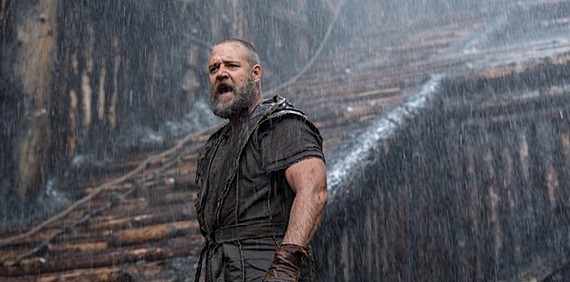Since the newest information from the IPCC came out last Monday, I have immersed myself in reading the details of the report. The New York Times captured the essence of the Working Group II findings with the headline: "Panel's Warning on Climate Risk: Worst is to Come."
Yet in every conversation that I read online, there were two categories of commenters: Those who have given up on our national political system to mobilize ("Lost cause"); those who were indignant about the "climate hoax," especially as a thinly veiled excuse to "redistribute wealth" to poorer nations.
I wrestled for seven days with an inner dialogue on how to frame a story that most Americans are resistant to considering. Then I had a moment of realization when I heard that the new movie Noah had made $44 million in ticket sales at the American box office. The religious right has already accused director Darren Aronofsky of tampering with the Biblical text and giving his movie an "environmental message," but that hadn't deterred movie audiences. I have only seen the trailer, but I can intuit how those parallels are being drawn. You've got a major flood and "violent conflict." In addition, Aronofsky has referenced the recent IPCC findings in interviews.
The IPCC underscores how climate change will impact the world's population through changes in crop production, yielding an increased chasm between supply and demand. Those without resources and capital will be more drastically affected -- such as in the poorer nations in Sub-Saharan Africa.
If I made a word cloud of the top phrases pulled from the report they would be: drought, extreme heat, floods, coastal erosion, disease, hunger, food instability, war and refugees.
Which brings us to a different set of words: managed risk, mitigation, moral responsibility and political will. To me, the natural ensuing question is, "If you thought there was a chance that something bad could happen, would you do something to prevent it?"
Insurance companies have been one of the earliest mainstream adopters of advocating the need for readiness. That's their business, and they are basing their position on science. Nothing ever seems like it can happen, until it happens to you personally. I was in Vermont "on vacation," when they had torrential rains and everything from bridges to graves were washed away. I was in Manhattan when Hurricane Sandy hit. The subways were underwater and I had friends stranded without electricity or food. New Yorkers saw very clearly how vulnerable our infrastructure was.
"Impacts, adaption and vulnerability." These are the key points the IPCC drills down on. It's interesting that wildlife has already responded intuitively. Birds have changed their migration patterns, which were previously established based upon the "seasons."
ExxonMobil has told shareholders they have no plans to change their trajectory. Sen. James Inhofe (R-OK), author of The Greatest Hoax: How the Global Warming Conspiracy Threatens Your Future, dismissed the report as a "distraction from real problems -- like poverty and violence." To which I respond, "Sen. Inhofe, sir, refusing to acknowledge the findings of 97 percent of scientists is paving the road to global poverty and violence."
How much longer can we as individuals, and as a nation, look away from our moral responsibilities? Why aren't we pushing our politicians and lawmakers to insist on sustainable practices to manage risk now, while promoting renewable energy?
Climate scientist Katharine Hayhoe said of climate change, "It's going to affect nearly every aspect of human life on this planet."
United Nations Secretary-General Ban Ki-Mon defined climate change as, "The greatest collective challenge facing humankind today."
Secretary of State John Kerry, who was mocked by Sen. John McCain and Newt Gingrich for his strong stand on the perils of climate change reacted to the report stating, "The costs of inaction are catastrophic ... The clock is ticking. The more we delay, the greater the threat. Let's make our political system wake up and let's make the world respond."
Sometimes it's hard to hear the "prophets" in your midst.
A version of this post originally appeared on the website Moms Clean Airforce
Tell the EPA You Support New Limits on Carbon Pollution

